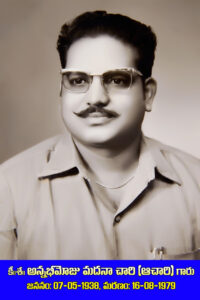 Annabhimoju Madana Chary, fondly known as Achari, was born into a modest family in Miryalaguda on May 7, 1938, to Annabhimoju Sambaiah and Kanthamma. His natural leadership abilities surfaced early, catching the eye of his elder brother, the late Sri Saidaiah Chary, who played a pivotal role in nurturing and refining these qualities. Achari, alongside his brothers, ventured into the construction field, and under the guidance of his brother, he took charge of managing laborers at the work site.
Annabhimoju Madana Chary, fondly known as Achari, was born into a modest family in Miryalaguda on May 7, 1938, to Annabhimoju Sambaiah and Kanthamma. His natural leadership abilities surfaced early, catching the eye of his elder brother, the late Sri Saidaiah Chary, who played a pivotal role in nurturing and refining these qualities. Achari, alongside his brothers, ventured into the construction field, and under the guidance of his brother, he took charge of managing laborers at the work site.
Together, the brothers left an indelible mark on Miryalaguda by contributing to the construction of iconic buildings such as the Mandal Praja Parishad office, K.R. Estate, Shakuntala, and Srinivasa Theatres.
Beyond his work, Achari had a passion for collecting unique items, including a Diesel JAVA bike customized with a 12-barrel gun, showcasing his love for rare possessions.
A pivotal moment in Achari’s life occurred during the Telangana Agitation in 1969, marking the beginning of his political journey. Co-founding the Telangana Praja Samithi (TPS) with his younger brother, the late Sri Janardhana Chary, Achari played a fearless role in the movement. His bravery was evident when he seized 303 Rifles from the police, breaking one with his bare hands, symbolizing his strength. Despite facing police firing and losing a comrade, Achari’s determination for a Separate Telangana State led to a six-month imprisonment, from which he was released with the support of his elder brother and family friend Sri C.D. Naidu.
Post-release, Achari merged TPS with Congress, initiating his political career under the guidance of Late Sri Tippana Krishna Reddy. Recognizing Achari’s leadership, he became the Taluka President for the Weaker Section, forming numerous unions in Miryalaguda.
In 1975, Achari assumed the role of Chairman of the Agricultural Market Committee, implementing reforms to protect farmers from exploitation. He advocated for increased salaries for contract employees, built storage facilities for crops, and erected a compound wall around the Market Office and Rural Policy Station.
Achari’s commitment extended to education and infrastructure, including the construction of the Girl’s High School and the New Bus Stand in Miryalaguda. His efforts also improved transportation links with neighboring villages, exemplified by the construction of roads connecting various areas.
Not limited by religion or locality, Achari believed strongly in secularism. Persuading his brothers, he generously donated land to nearly 50 migrant Sikh families in Miryalaguda. Achari’s friendly demeanor and philanthropic activities endeared him to the community.
Tragically, on August 16, 1979, while attempting to save a friend from an assassination attempt, Achari lost his life. His town mourned deeply, remembering him for his courage, leadership, and selfless service.
